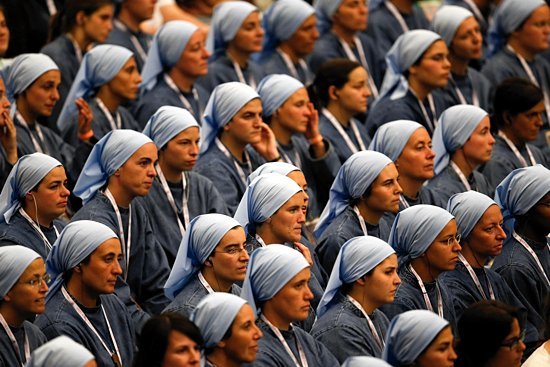After the upheaval of the 1960s, religious orders across the board, for men and women, entered a free-fall in terms of numbers. Once full-to-capacity monasteries and convents faced closure and extinction. Cultural currents outside the Church certainly played their part in the decimation. During this era, many orders ditched or heavily modified their old constitutions, traditional habits and convents in favor of political activism, modern dress and condominium living. Whether that trend had more to do with the outright contempt for tradition that Russell Kirk so correctly identified as one of the four hallmarks of any true revolution, or was simply a well-intentioned but misguided attempt to be “relevant” and with the times is for another post. I have my own thoughts on the subject. Not surprisingly, the numbers of religious started to plummet. Why surrender your life to God completely as a religious only to live like everyone else in dress and other things?
In the younger generation of today however, we see something positive. Contrary to the agitated and rebellious youth of the 1960s, young people today see tradition as a positive countercultural option to consider and even embrace. The great leveling of the 1960s which sought to sweep away the past has run its course and left many feeling empty and disoriented. That revolutionary proposition is now seen as old and boring to younger people who desire something solid, enduring and timeless.
Along these lines, The New York Times featured an excellent piece by Mark Oppenheimer on traditional religious orders for women in the United States. Here’s an excerpt:
The younger nuns can be a surprising bunch. While many in the older generation moved to the left after the 1960s, in theology and politics — a trend that led in part to Pope Benedict XVI’s investigation of American nuns in 2012 — younger nuns tend to be more conservative. They want to wear the habit. While they work outside their communities, they have a strong focus on contemplative life, making time for hours of daily communal prayer. . . .
The members may hold to traditional teachings, but as they see it, there is nothing more countercultural in 2015 than a young woman’s becoming a nun — eschewing careerism, material possessions, sex. Two other traditionalist orders — a Dominican order in Nashville, and one in Ann Arbor, Mich., which has expanded to Austin, Tex. — have attracted national attention; in 2010, the Ann Arbor nuns even made it on “Oprah.”



